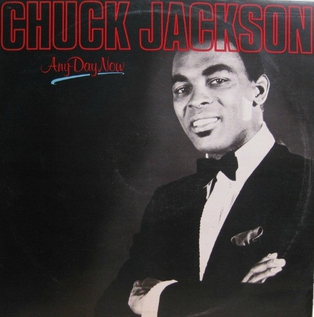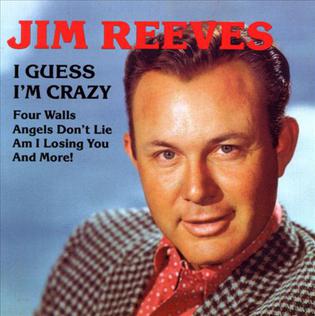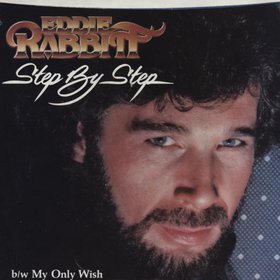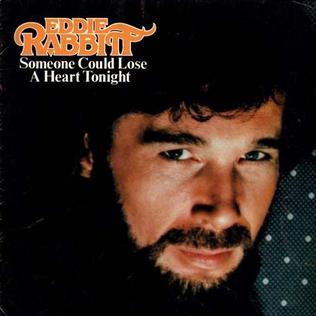Related Research Articles
"There Goes My Everything" is a popular song written by Dallas Frazier and published in 1965. "There Goes My Everything" is now considered a country music standard, covered by many artists.

"My Special Angel" is a popular song by Jimmy Duncan, published in 1957.
"It Must Be Love" is a song written by Bob McDill, and recorded by American country music artist Don Williams. It was released in July 1979 as the third single from the album Expressions. The song was Williams' ninth Number One single on the U.S. Billboard Hot Country Singles charts.
James Frederick Knobloch, known as J. Fred Knobloch or Fred Knoblock, is an American country singer-songwriter.

"Any Day Now" is a popular song written by Burt Bacharach and Bob Hilliard in 1962. It has been recorded by numerous artists over the years, including notable versions by Chuck Jackson in 1962, Alan Price in 1965, Elvis Presley in 1969, Scott Walker in 1973 and Ronnie Milsap in 1982. In the lyrics, the singer predicts the imminent demise of a romantic relationship and describes the sadness this will leave.
"Funny How Time Slips Away" is a song written by Willie Nelson and first recorded by country singer Billy Walker. Walker's version was issued as single by Columbia Records in June 1961 and peaked at number 23 on the Hot C&W Sides chart. The song would go on to be featured in several live action films and shows, such as in the first episode of the second season of AMC’s “Better Call Saul,” or the 2020 Netflix drama “The Devil All the Time.”
"Please Help Me, I'm Falling" is a 1960 song written by Don Robertson and Hal Blair and first recorded by Hank Locklin. The single was Locklin's most successful recording and was his second number one on the country charts. "Please Help Me, I'm Falling" spent 14 weeks at the top spot and spent nine months on the country chart and crossed over to the Hot 100 peaking at number eight.
"Ruby Ann" is a song written by Lee Emerson, Rashima Bellamy and Roberta Bellamy, and recorded by American country music artist Marty Robbins. It was released in October 1962. "Ruby Ann" was the number one country follow-up to "Devil Woman." "Ruby Ann" spent a single week at number one and crossed over to the pop chart peaking at number eighteen. On the Easy Listening chart "Ruby Ann" went to number four.
"There's a New Moon Over My Shoulder" is a 1944 song written by Jimmie Davis, Ekko Whelan, and Lee Blastic and made popular by Tex Ritter. The song was the B-side to Tex Ritter's, "I'm Wastin' My Tears on You". "There's a New Moon Over My Shoulder" peaked at number two on the Folk Juke Box charts.

"I Guess I'm Crazy" is a 1955 song composed by Werly Fairburn. The song was first recorded in 1955 by Tommy Collins who peaked at number thirteen on the C&W Best Seller chart.
"I Wanna Live" is a song written by John D. Loudermilk and recorded by American country music singer Glen Campbell. It was released in March 1968 as the lead single from the album, Hey Little One. The song was Campbell's sixth release on the country charts and his first of five number ones on the country chart. The song spent three non-consecutive weeks at number one and a total of fifteen weeks on the country charts. The song was also Glen Campbell's third Top 40 release peaking at number thirty-six.
"Sometimes" is a 1975 song written by Bill Anderson, and performed by Bill Anderson and Mary Lou Turner.
"Last Date" is a 1960 instrumental written and performed by Floyd Cramer. It exemplifies the "slip note" style of piano playing that Cramer made popular. It peaked at number 11 on the country chart and at number two on the Hot 100 behind "Are You Lonesome Tonight?" by Elvis Presley. Cramer's recording inspired a number of successful cover versions, including a vocal adaptation by Conway Twitty.
"Is It Wrong (For Loving You)" is a song written by Warner Mack. Mack recorded the song in 1957, and reached No. 9 on the Billboard country charts and spent 36 weeks on the chart.

"Could I Have This Dance" is a song recorded by the Canadian country music artist Anne Murray. It was used in the 1980 film Urban Cowboy and appeared on both the Urban Cowboy soundtrack album for that film, as well as on the Anne Murray's Greatest Hits compilation album, issued in late 1980. Later on, it also appeared on Murray's 2007 album Anne Murray Duets: Friends & Legends, performed as a duet with Amy Grant.

"Blessed Are the Believers" is a song written by Charlie Black, Rory Bourke and Sandy Pinkard, and recorded by Canadian country music artist Anne Murray. It was released in March 1981 as the first single from Murray's Gold-certified Where Do You Go When You Dream album.

"Loved 'Em Every One" is a song written by Phil Sampson, and recorded by American country music artist T. G. Sheppard. It was released in March 1981 as the first single from the album I Love 'Em All. The song was Sheppard's seventh number one on the country chart. The single stayed at number one for one week and spent ten weeks on the country chart. "I Loved' Em Every One" was also Sheppard's only Top 40 single on Billboard's Hot 100, reaching #37.

"Step by Step" is a crossover song co-written and recorded by American country music artist Eddie Rabbitt. It was released in July 1981 as the first single and title track from the album Step by Step. The song was Rabbitt's ninth number one single on the country chart. The single stayed at number one for one week and spent a total of 11 weeks on the country chart. It was written by Rabbitt, Even Stevens and David Malloy.

"Someone Could Lose a Heart Tonight" is a song co-written and recorded by American country music artist Eddie Rabbitt. The song was written by Rabbitt, Even Stevens and David Malloy.
"Try a Little Kindness" is a song written by Curt Sapaugh and Bobby Austin, first recorded by American country music singer Glen Campbell. The song was a hit on three different music charts: it peaked at number two for one week on the country charts. "Try a Little Kindness" went to number one for one week on the Hot Adult Contemporary chart as well as peaking at number 23 on the Billboard Hot 100.
References
- ↑ BMI Repertoire Note: need to type song title or author's name into search line of website
- ↑ Whitburn, Joel (2004). The Billboard Book Of Top 40 Country Hits: 1944-2006, Second edition. Record Research. p. 170.
- ↑ Whitburn, Joel (2004). The Billboard Book of Top 40 Hits: Eighth Edition. Record Research. p. 311.
- ↑ Billboard Top 100 online